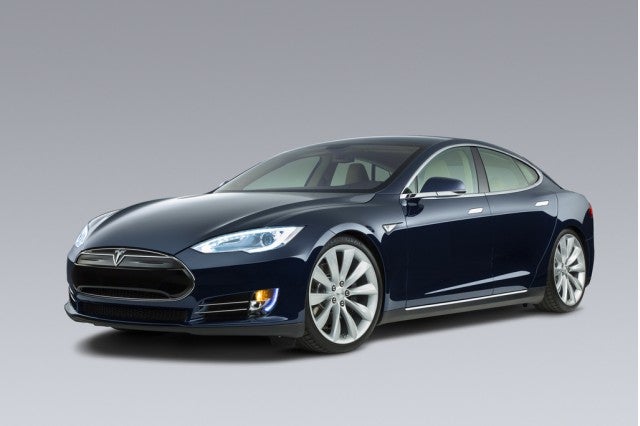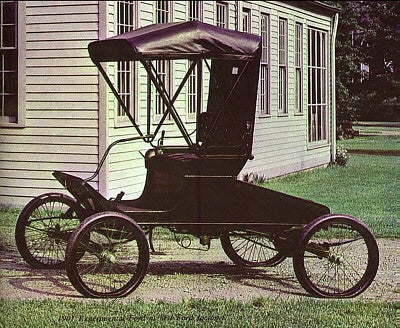 "philipilihp" (philiphilip)
"philipilihp" (philiphilip)
11/27/2013 at 10:54 • Filed to: Rantlopnik, electic cars
 0
0
 10
10
 "philipilihp" (philiphilip)
"philipilihp" (philiphilip)
11/27/2013 at 10:54 • Filed to: Rantlopnik, electic cars |  0 0
|  10 10 |

5 Ways Electric Cars Could Be Safer Than Gasoline Powered Ones." Obviously, this being a car-related article, I clicked.
I am by no means a principled opposer of electric cars in any way. I have my grievances with the technology, including environmental damage from battery production/transportation to assembly points and range issues, but I am not against electric vehicles in general.
However, as I was readying through these 5 ways electric cars could be safer than gas powered ones, I couldn't help but get a little defensive of good ol' fossil fuel burners, mostly because the reasons given here to support the article title come across as short-sighted and highly subjective. So as a response, here are my objections to each of the 5 reasons given, and please feel free to point out any and all shortcomings, as well as additional reasons in the comments.
1. "Gasoline is concentrated in a single large tank. The flammable liquid electrolyte that burns in battery fires is contained in small packages. That provides more opportunities for protecting the electrolyte and slowing the spread of a fire if one of them has a problem. The recent fires in the Tesla Model S were contained in the front part of the car."
This irked me on multiple levels. For starters, though the flammable liquid electrolyte in batteries is spread out over multiple batteries, usually the battery packs are concentrated in one area, eg. the trunk, making it essentially no different than one large fuel tank for gas. Also, gasoline by itself is not easily flammable, but needs to be vaporized and/or be exposed to extreme heat. Plus, in the case of battery fires, they are much harder to put out than gasoline fires, as the cores of the batteries will smolder undetected for days, leading to issues such as the well-documented Chevy Volt post-crash combustions.
2. "You don't have to refuel batteries, so there's no pumping of flammable liquids."
I don't have too much to say about this one, besides that it is an issue of semantics to say batteries are not refueled but rather recharged.
3. "Electric cars have far fewer moving parts than gasoline ones, so there will be fewer things to break down. A large share of the fires in conventional cars are the result of the failure of mechanical parts."
Yes, a large share of fires in conventional cars are caused by failure of mechanical parts. However, most of the mechanical parts that cause fires are radiators causing engine overheating, or parts such as worn hoses causing fuel leaks. I would hardly call the relative wealth of moving parts in a combustion engine an inherent fire risk. In addition, !!!error: Indecipherable SUB-paragraph formatting!!! , which are definitely not limited to gas powerd vehicles.
4. "During normal operation, you don't set fire to the electrolytes in batteries. But gasoline engines operate by deliberately exposing gasoline to a spark. The engines run hot. It's a tricky mix to manage."
Gasoline engines do run hot. This is true. And this is why we have radiators in cars. It is a tricky mix to manage, but this mix has been pretty successfully managed for more than 100 years, so again, the fact that gasoline is ignited in a combustion cycle is not an inherent risk of vehicle fire.
5. "And electric vehicles don't emit pollution locally, which will improve air quality in cities, reducing death and sickness especially in countries like China. Pollution from the power plants that are used to charge electric cars is easier to control and monitor than pollution from millions of gasoline tailpipes."
This might be the worst argument yet, as it is not only short-sighted, but also incredibly selfish. Electric vehicles don't emit pollution locally, but their production for the majority in China , does cause large amounts of damage to the environment. From mining, to transportation, to refining, to battery production itself, all these processes, while not harming our urban centers, do harm the environment in general, which in turn affects us greatly wherever you happen to live in the world. I would argue it is easier to research and develop better catalytic converters and more efficient combustion engines than to produce batteries for electric vehicles on a large scale.
Electic cars in particular, and alternative fuel cars in general are intriguing solutions to the problems of pollution. However, to argue that electric cars are inherently safer than gas powered cars is just not acurate. Even if the article appears on the MIT Technology Review website.
 offroadkarter
> philipilihp
offroadkarter
> philipilihp
11/27/2013 at 11:26 |
|
I lol'd at the local pollution line. Yes, your home in the Hamptons won't be hampered down by nasty smog, but the 12 year old kids in China who assemble the batteries for your Tesla have to walk to work in acid rain every day.
Eco friendly!
 deekster_caddy
> philipilihp
deekster_caddy
> philipilihp
11/27/2013 at 11:28 |
|
I drive a Volt, and have a couple responses to your thoughts. (I haven't read the article you mention specifically, but I have heard most of these arguments before)
The one Chevy Volt post-crash combustion (not plural) at the NHTSA started 3 weeks after the crash, and the NHTSA did not follow GM's well documented instructions to drain the fluids from the battery. The fire was started by coolant (liquid, antifreeze) seeping onto a circuit board. The only other "Chevy Volt fire" that I have heard of is because somebody's garage caught on fire, which was documented to an electrical issue in their garage. If you are going to charge an EV at home, get yourself a dedicated outlet installed by a professional electrician!!! There are many instances of people browning or melting outlets that aren't good quality or ready for an extend heavy load like charging an EV.
Re: power plant pollution - one thought to keep in mind is that any benefit created by cleaning up a power plant or changing fuels, etc is instantly applied to the electricity used by your EV. You don't have to wait for the next catalytic converter technology to get down the production line, or a new engine design to reach consumer levels - it's immediately built in. Yes, there are dirty power plants, and I'm not a big fan of coal OR natural gas being used for it, but I also primarily charge my car overnight, when electricity is abundant and cheap. (Time of use metering has saved us a TON of money - our electric bill actually didn't change at all from before I had my Volt because of the metering/billing change)
I'm not convinced that mining for battery minerals is any worse/better than all the oil we suck out of the ground, or fracking for natural gas. I wish there was more solar, better/safer nuclear, etc.
Driving an EV is more than a statement about pollution. It's not at all my primary reason for getting the Volt - I got the Volt because it's fascinating, and I want the technology to catch on. EV sales need to reach a tipping point before they can become a factor the 'average' car buyer will consider. EV driving is quite an experience. I'm almost a year on my Volt and it's still fun and fascinating to drive.
I'm a gearhead. I've got a '73 Buick and '54 MG at home. I'm a boy scout - I was taught to leave the place cleaner than I found it. I think using less gas in the long run will do that. Today's electrics and new battery technologies are really bringing EV's around the curve towards a possible solution, or part of the solution. I see no reason why a car like the Volt can't succeed. I have no idea what "range anxiety" is. I've driven my car on a few thousand mile trips and it just goes. I drove it to the top of Mt Washington, up the Auto Road just for kicks. It works like it's supposed to! I really think the market is becoming more accepting of these drivetrains.
Sorry for rambling on so much!
 davedave1111
> philipilihp
davedave1111
> philipilihp
11/27/2013 at 11:33 |
|
Of course it's mostly just a FUD piece, but the last point is correct. It's a strictly limited point, but electric vehicles move the emissions from cities elsewhere. Production is not germane, because it's not saying that overall electric cars are greener (right there, anyway).
Electric vehicles do indeed make a lot more sense in the middle of large cities than out in the countryside - electric vehicles, not bullshit petrol-car-aping 'cars'. I assure you, central London would be a much more pleasant place without all the vehicle fumes, or even just without a chunk of them. I can't wait for battery or supercap buses here.
Incidentally, the supercapacitors I've read about seem to be a hell of a lot less messy than batteries, when it comes to extraction, processing, and manufacture. They're activated carbon - charcoal, basically - instead of the nasty stuff in batteries.
Electric power works very well in much more specialised applications than the general-use car. Electric bicycles are great commuter vehicles, for example, if you live in a city. 10-12mph is fine, generally, to beat either public transport or driving on most urban routes. When you can manage that on a sit-up-and-beg, wearing a suit and without breaking sweat, it's a really good way to get around as long as it's not raining.

You get 20-30 miles range, maybe less at full power, but you can take the battery inside with you to recharge all day at work.
Obviously that's not for everyone, because some people have completely unsuitable commutes. I just raise it as an example of a really good electric vehicle to show what you can get when people focus on what electric power is actually good at.
 philipilihp
> deekster_caddy
philipilihp
> deekster_caddy
11/27/2013 at 11:37 |
|
The key in general is to, like you said, leave the place cleaner than when you found it, and any and all technologies that go towards that goal are great. I'm highly against fracking for natural gas and off-shore drilling, as the benefits do not nearly outnumber the risks. I always hoped hydrogen fuel cell technology would catch on more, especially in urban public transport, where refuelly infrastructure would me much easier to set up. Or even audi's alleged e-gas!
I was just bothered by the short-sighted, subjective tone of the article. It's not right to say electric cars are by definition any safer than combustion cars.
 philipilihp
> davedave1111
philipilihp
> davedave1111
11/27/2013 at 11:40 |
|
And maybe that is the best point to make on any subject of electric vs. gas: that the "goal" shouldn't be to replace gas power with electical power completely, but have each do what it does best. I would be totally fine driving an electric vehicle to work if I had a gas powered car to play with too.
 davedave1111
> philipilihp
davedave1111
> philipilihp
11/27/2013 at 11:47 |
|
What we really need are commuter vehicles cheap enough that they don't have to pretend to be cars, whatever they're powered by. The Smart would have been great if it sold for a couple of thousand bucks, after cutting out the ability to just about go on the highway.
I wouldn't want to mix with regular traffic in a microcar, but I'd happily drive one on segregated roadspace. Imagine driving to work in something like a covered shifter kart...
 philipilihp
> davedave1111
philipilihp
> davedave1111
11/27/2013 at 11:51 |
|
How about an electric version of the Clarkson P45?

 Jayhawk Jake
> philipilihp
Jayhawk Jake
> philipilihp
11/27/2013 at 11:57 |
|
What's stupid about this article is it overlooked the actual benefits of electric cars with regards to safety.
No engine in front means a huge crumple zone. Heavy batteries in the bottom of the car means a lower cg, which improves stability.
Don't even get me started on the pollution issue, that's some serious bullshit. Electricity isn't free folks.
 davedave1111
> philipilihp
davedave1111
> philipilihp
11/27/2013 at 11:58 |
|
I wouldn't mind a scaled-down, single seater version of this:

 deekster_caddy
> philipilihp
deekster_caddy
> philipilihp
11/27/2013 at 12:04 |
|
Definitely agree. Are EV's "Safer"? If you mean safer as in they aren't carrying around a tank of gas, well that's all debateable. Gas tanks are designed not to rupture with decades of research. The Chevy Volt's batteries are enclosed in a reinforced tunnel and so far EV batteries seem to ignite much slower than gasoline. The whole "Safer" angle is tough to prove. To my knowledge there has not been one Volt fire "in the wild". There are something like 30,000 of them on the road now, so more than Teslas, and there have been 3 Tesla fires already. What does that say? Who knows!
Here's a tidbit from the mighty wiki in the sky:
the National Highway Traffic Safety Administration (NHTSA) issued a statement saying that the agency does not believe the Volt or other electric vehicles are at a greater risk of fire than gasoline-powered vehicles. "In fact, all vehicles –both electric and gasoline-powered – have some risk of fire in the event of a serious crash."
http://en.wikipedia.org/wiki/Plug-in_e…